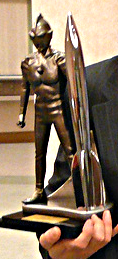Looking for a Sign From God
The political blogger Andrew Sullivan has a weird practice of running emails from readers without naming or crediting the sender in any way, which to me makes him look like a spotlight hog. Here's a great one he received yesterday:
I was backpacking about twenty five years ago through Portland, Oregon and stopped to ask directions from a woman putting up marquee letters on a Baptist church sign (some message about Jesus but it was just started so I don't know what she intended to write).
I was looking for directions to a hostel. She was there with her son (I think he was about seven) and said perhaps she could give me a ride, but she had to pray on it. She paused and quietly prayed and then said, no, she could not give me a ride. She did not know where the hostel was. Still, she was pleasant enough, if a bit weird. I thanked her for considering it.
I enjoyed the encounter for its unique strangeness, but I really did not want a ride, so I was secretly relieved. Did God answer my prayer or hers?
Locus Awards Change Rules, Foil Cory Doctorow
Cory Doctorow's short story collection Overclocked was nominated this year for a Locus Award, a science fiction honor voted on by the public and tabulated by Locus magazine. Votes were accepted online, and several links during the balloting on Doctorow's ginormously popular Boing Boing blog helped his book receive the most votes in that category.
But if you check out the award winners, you won't find Doctorow's book on the list. Locus changed the rules after voting was over, deciding to give votes from its subscribers twice as much weight as non-subscribers, as the magazine explained in the print edition of its July issue:
Connie Willis's The Winds of Marble Arch and Other Stories won with a lead of just over 70 points, followed by Jack Vance's The Jack Vance Treasury in second. Cory Doctorow's Overclocked came in third -- despite having the most votes and the most first-place votes. The doubled subscriber votes made Willis, ever a favourite with Locus subscribers, the winner; without the extra points, she would have come in second behind Doctorow, who has a large online fan base.
So the nominee with the most votes and most first-place votes finished third. This quote from Locus comes from a blogger for Vector magazine, who points out that fixing the results didn't stop the magazine from bragging about how many people voted:
The big selling point of the Locus Awards is, or always has been to me at least, their representativeness, precisely the fact that anyone can vote and that they are thus the best barometer of community-wide opinion that we have. As the notes at the start of this year's result somewhat smugly put it, "We get more votes than the Hugo, Nebula, and World Fantasy nominations combined" ... it seems wrong to imply (as I think it's intended to imply) that this legitimizes the results when you've just changed the scoring system to make some voters more equal than others -- particularly if you only make the change after voting has closed, particularly if you only mention it in the print version of the magazine.
Unexpectedly, I couldn't find any mention of this stolen election on Boing Boing.
Credit: The photo of Doctorow was taken by Ed Schipul and is available under a Creative Commons license.
Displaying Twitter Updates on a Web Page
I recently began using Twitter, a microblogging service for posting short, chat-like blog entries and reading what other users of the service are doing. The site has severe reliability problems, but it's still an entertaining way to get real-time updates from bloggers I read along with others I know who've been sucked into Twitter's maw.
I wrote some code to display my most recent Twitter update on my weblog, Workbench, in a sidebar at upper right. This afternoon, I've released the Twitter-RSS-to-HTML PHP script under an open source license. The script requires MagpieRSS for PHP, an open source PHP library that can parse RSS and Atom feeds.
MagpieRSS caches feed data, so at times when Twitter is glacially slow or can't be accessed, this script won't hurt the performance of your server.
The first release of the script only works with a Twitter user's RSS feed, which can be found in the "RSS" link at the bottom of a user's Twitter page. The only tough part about writing the script was creating regular expressions to turn URLs into hyperlinks and "@" references into links to Twitter user pages:
// turn URLs into hyperlinks
$tweet = preg_replace("/(http:\/\/)(.*?)\/([\w\.\/\&\=\?\-\,\:\;\#\_\~\%\+]*)/", "<a href=\"\\0\">Link</a>", $tweet);
// link to users in replies
$tweet = preg_replace("(@([a-zA-Z0-9]+))", "<a href=\"http://www.twitter.com/\\1\">\\0</a>", $tweet);
If you're reading this and wondering why anyone should bother with Twitter, I recommend reading the updates by Jay Rosen, a former university journalism chair who uses the service to share a running dialogue on the media. He punches above his weight in this 140-character-or-less medium.
Voting Ends for This Year's Hugo Awards
 Today's the last day to vote on the 2008 Hugo Awards, which will be given out at the World Science Fiction Convention next month in Denver. I joined the convention as a supporting member last fall to vote for the first time on the awards, which began in 1955 and have become the most coveted prize in science fiction.
Today's the last day to vote on the 2008 Hugo Awards, which will be given out at the World Science Fiction Convention next month in Denver. I joined the convention as a supporting member last fall to vote for the first time on the awards, which began in 1955 and have become the most coveted prize in science fiction.
In April, the Hugo nominees were announced. All of the nominees in several categories can be read for free online, including short stories, novellas, novelettes and fanzines. Four of the five best novel nominees were privately shared with voters as ebooks.
I won't disclose my votes until after the ceremony (if at all). I skipped most categories because I hadn't read enough of the nominees, but I did read all of the Best Short Story choices. Three of the five are terrific stories that were hard to rank from first to third. The other two not so much; I ranked them lower than "No Award."
The nominees, in alphabetical order:
- "A Small Room in Koboldtown" by Michael Swanwick, from the April/May 2007 issue of Asimov's Science Fiction
- "Distant Replay" by Mike Resnick, from the April/May 2007 Asimov's
- "Last Contact" by Stephen Baxter, from The Solaris Book of New Science Fiction 2007
- "Tideline" by Elizabeth Bear, from the June 2007 Asimov's
- "Who's Afraid of Wolf 359?" by Ken MacLeod, from The New Space Opera
If you'd like to vote in the next Hugos, become an attending or supporting member of the WorldCon convention for Montreal in 2009. I got carried away and have already joined Australia in 2010 and Seattle in 2011, though they could still get beaten out by another site.
Credit: The photo of a 2007 Hugo Award statue was derived from a photo taken by Cory Doctorow and is available under a Creative Commons license.
How to Deal With Obnoxious Blog Comments
 Matt Asay, an executive who writes CNET's Open Road open source blog, got so mad at commenters on his site yesterday that he began hunting them down:
Matt Asay, an executive who writes CNET's Open Road open source blog, got so mad at commenters on his site yesterday that he began hunting them down:
... most people are not jerks. They just become losers when cloaked in anonymity. They say things they'd never say if confronted with the people they flame on discussion boards, in comments sections, etc. They're probably nice people "in real life." It's just on the web that they let it all hang out, to the detriment of the web and intelligent discussion.
Take the comments to one of my recent posts. The first is led off by "h3h" who apparently has no sense of humor (completely missing my point in the post), but can't leave it at that, then going on to lob ad hominems into his "argument."
"H3h" turns out to be Brad Fults. Judging from his Flickr feed and Twitter feed, he's probably an OK guy. He happens to be wrong in the way he chose to comment on this blog, but he's probably a well-intentioned person, normally.
Asay doesn't seem to understand the concept of anonymity. Fults' comments on CNET include a link to his web site, which contains his name and is presumably how Asay found it.
Anyone who reads Workbench knows that I get my fair share of anonymous abuse, particularly from people who read my Target story and let me know I'm a bad parent. That never gets old.
If you publish on the web and accept user comments, you're going to be a punching bag for a steady procession of dillweeds. Your choices are to stop taking comments, pick them off one by one like Asay, or just keep telling yourself you're a beautiful snowflake and soldier through it.
Credit: The photo of Matt Asay was taken by Ilya Schurov of Computerra Weekly and is available under a Creative Commons license.
Tropical Storm Bertha Forms in East Atlantic
Tropical Storm Bertha formed in the Atlantic today at a record-setting location that suggests an active hurricane season, meteorologist Jeff Masters blogs:
Today's formation of Bertha at 25 degrees West longitude is the farthest east a tropical storm has ever formed in the Atlantic so early in the season. It is also the farthest east a tropical storm has formed in the month of July. Reliable records of Eastern Atlantic storms go back to 1967, the beginning of the geostationary satellite era.
Is the formation of Bertha a harbinger of an active hurricane season?
Probably. According the the Hurricane FAQ, "as shown in (Goldenberg 2000), if one looks only at the June-July Atlantic tropical storms and hurricanes occurring south of 22 degrees N and east of 77 degrees W (the eastern portion of the Main Development Region [MDR] for Atlantic hurricanes), there is a strong association with activity for the remainder of the year."
Current models forecast a path for Bertha that will curve north and miss the U.S., but there's not a lot of confidence in that prediction yet.
Buscarlos Sonidos Magicos de Ecuador
Liking this song exposes me to "you know how I know you're gay?" ridicule, but every time I hear "Ecuador" by Sash I crank the knob up to 11 and reinsert "Escuchame!" back into my vocabulary.


